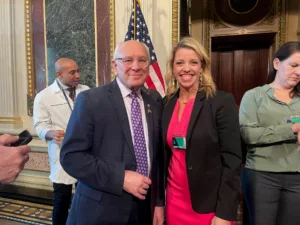AAPA President Orozco Attends White House Event to Mark the End of Buprenorphine X-waiver
Removal of Bureaucratic X-waiver Will Improve Treatment for Patients Struggling with Opioid Addiction and Save Thousands of Lives
January 24, 2023
AAPA President and Chair of the Board of Directors, Jennifer M. Orozco DMSc, PA-C, DFAAPA, attended a ceremony at the White House today celebrating the enactment of the Mainstreaming Addiction Treatment (MAT) Act and other measures passed by Congress to address opioid use disorder (OUD). The provisions, which impact PAs who treat patients with OUD and prescribe buprenorphine, were included in the end-of-year $1.7 trillion omnibus package, which was signed into law by President Biden on December 29, 2022.

[Help further AAPA’s advocacy work – join or renew your membership today]
Long supported by AAPA, the MAT Act eliminates the burdensome federal requirement that PAs and other healthcare providers with a Drug Enforcement Administration (DEA) license obtain a special waiver (also known as the X-Waiver) to prescribe buprenorphine for OUD treatment. Buprenorphine is a safe and effective medication proven to reduce overdose deaths, curb illicit drug use, and help patients adhere to treatment. However, until now, outdated federal regulations have kept this lifesaving medication out of reach for many patients.
“Doing away with the X-waiver is a game changer in addressing the nation’s opioid epidemic,” said Orozco. “Addiction is a disease that does not discriminate, and no community is spared its heartbreaking effects. Overdoses have claimed the lives of our mothers, fathers, sisters, brothers, uncles, aunts, and friends. This law will save lives by empowering PAs and other providers to more effectively and efficiently treat patients struggling with addiction. I am proud of AAPA and our Advocacy Team’s work on behalf of PAs. Our persistence will have an immediate and sustained impact on the patients and communities that we serve every day.”
Research shows that people of color, veterans, new mothers, and rural Americans experience overdose deaths at alarming rates and often lack equal access to lifesaving treatment. By expanding access to buprenorphine, the MAT Act has the potential to prevent more than 30,000 overdose deaths annually and expand access to equitable care and long-term recovery. This is a critical step forward at a time when fewer than 1 out of 10 Americans in need of OUD treatment can access it.
The prior federal restrictions on buprenorphine required healthcare providers to limit the number of patients they could treat with OUD, file special registrations with the Substance Abuse and Mental Health Services Administration (SAMHSA) and the DEA, and mark their prescriptions with an identifier that discloses the patient’s OUD. No other medical condition is subject to such stringent restrictions. The new law will now increase access to treatment, integrate OUD care into the healthcare system, and help erase the stigma associated with seeking treatment.
Earlier this month, the DEA issued its first guidance on the implementation of the MAT Act, informing prescribers of the following:

- A DATA-Waiver registration is no longer required to treat patients with buprenorphine for opioid use disorder.
- Going forward, all prescriptions for buprenorphine only require a standard DEA registration number. The previously used DATA-Waiver registration numbers are no longer needed for any prescription.
- There are no longer any limits or patient caps on the number of patients a prescriber may treat for opioid use disorder with buprenorphine.
- The Act does not impact existing state laws or regulations that may be applicable.
New Mandatory Training to Obtain or Renew DEA License Beginning June 2023
Separately, the omnibus package includes new training requirements for all prescribers requiring a one-time, non-repetitive, 8-hour training on managing patients with OUD. This new educational requirement is for all healthcare providers obtaining or renewing a DEA license. Importantly, the training requirements do not impact the changes related to eliminating the DATA-Waiver Program.
While AAPA did not support this new training requirement, the organization had significant engagement with Congressional lawmakers that persuaded Congress to establish a uniform training requirement of 8 hours. The original version of this legislation would have placed a 24-hour training requirement on non-MD/DO prescribers.
AAPA is also listed in the law as an eligible provider of the required training. The SAMHSA and DEA are working on the implementation of the training requirements, expected to become effective in June 2023. AAPA will continue to work with the administration as implementation moves forward and will provide additional information to PAs as it comes available.
You May Also Like
AMA House of Delegates Meeting Provides Opportunity to Continue to Build Relationships for PA Practice Advocacy
Release of PA Licensure Compact Model Legislation Critical Step Toward Advancing PA Profession Interstate Practice Mobility
What PAs Should Know About the 2023 Physician Fee Schedule Rule



